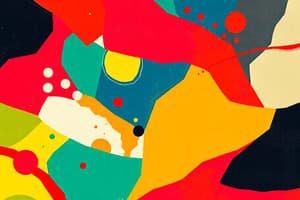Podcast
Questions and Answers
What type of coffee does Starbucks buy and roast?
What type of coffee does Starbucks buy and roast?
high-quality arabica coffee
In which year was Starbucks founded?
In which year was Starbucks founded?
1971
Starbucks was founded in 1980.
Starbucks was founded in 1980.
False (B)
What does C.A.F.E. stand for in C.A.F.E. Practices?
What does C.A.F.E. stand for in C.A.F.E. Practices?
What does ethical sourcing include according to Starbucks?
What does ethical sourcing include according to Starbucks?
In what year did Starbucks formalize its approach to ethical sourcing through a partnership?
In what year did Starbucks formalize its approach to ethical sourcing through a partnership?
What is one of the first third-party verified sets of sustainability standards in the coffee industry?
What is one of the first third-party verified sets of sustainability standards in the coffee industry?
In C.A.F.E. Practices, economic transparency requires suppliers to submit evidence of payments made for _____ coffee.
In C.A.F.E. Practices, economic transparency requires suppliers to submit evidence of payments made for _____ coffee.
Starbucks only purchases Fairtrade-certified coffees.
Starbucks only purchases Fairtrade-certified coffees.
What is the primary focus of Fairtrade coffee?
What is the primary focus of Fairtrade coffee?
Coffee is considered _____ when no pesticides, herbicides, fungicides or chemical fertilizers are used.
Coffee is considered _____ when no pesticides, herbicides, fungicides or chemical fertilizers are used.
What are the four components of C.A.F.E. Practices?
What are the four components of C.A.F.E. Practices?
Flashcards
Arabica Coffee
Arabica Coffee
A high-quality coffee bean grown within the Coffee Belt.
Ethical Sourcing
Ethical Sourcing
The practice of ensuring a product is acquired responsibly and sustainably.
C.A.F.E. Practices
C.A.F.E. Practices
A verification program ensuring coffee is ethically grown and traded.
Cupping
Cupping
Signup and view all the flashcards
Economic Transparency
Economic Transparency
Signup and view all the flashcards
Social Responsibility
Social Responsibility
Signup and view all the flashcards
Environmental Leadership
Environmental Leadership
Signup and view all the flashcards
Fairtrade Coffee
Fairtrade Coffee
Signup and view all the flashcards
Organic Coffee
Organic Coffee
Signup and view all the flashcards
Roasting
Roasting
Signup and view all the flashcards
Blending
Blending
Signup and view all the flashcards
Processing (Fruit Removal)
Processing (Fruit Removal)
Signup and view all the flashcards
Drying
Drying
Signup and view all the flashcards
Resting
Resting
Signup and view all the flashcards
Study Notes
Starbucks and Coffee
- Starbucks exclusively buys and roasts high-quality arabica coffee
- This coffee is found within the Coffee Belt
- Starbucks' mission and values focus on the quality of its coffee and customer experience since 1971
Factors Influencing Coffee Flavor
- Factors influencing coffee flavor, from growing and processing to roasting and blending, will be explored
- Ethical coffee purchasing and quality assurance from farm to cup are also covered
Starbucks' Ethical Sourcing
- Ethical sourcing ensures products are acquired responsibly and sustainably, especially for coffee
- This involves ensuring safe and fair working conditions for farmers and considering environmental/social impacts
- Since 1971, Starbucks has been committed to ethical sourcing
C.A.F.E. Practices and Conservation International
- In 1998, Starbucks partnered with Conservation International (CI), a nonprofit environmental organization
- In 2001, guidelines with Conservation International to ensure ethically grown and traded coffee, verification program C.A.F.E. Practices was created.
- C.A.F.E. stands for Coffee and Farmer Equity
C.A.F.E. Practices Overview
- C.A.F.E (Coffee and Farmer Equity) practices help create a long-term supply of high-quality coffee
- Their goal is to positively impact the lives and livelihoods of coffee farmers and their communities
- It is a set of sustainability standards in the coffee industry, verified by a third party
Quality Standards
- For coffee to be purchased, it needs to pass quality team standards through cupping (tasting).
- The higher the quality, the higher the price paid to the farmer.
- Starbucks tastes over 250,000 cups of coffee each year to ensure its quality.
Economic Transparency
- Starbucks changed coffee industry in 1998 by implementing economic transparency
- Suppliers must submit evidence of payments for green coffee, including how much was paid to farmers
- Economic transparency makes it possible to know which farms the beans come from, the farmers, and the price paid
- Transparency maintains strong relationships through supply chain and these relationships with suppliers/farmers must to be built on trust and honesty.
Social Responsibility in Coffee Production
- Coffee producers need to protect the rights of people laboring on their farms
- Producers need to implement measures that promote a safe, fair, and humane work environment
- Social responsibility includes providing habitable living conditions and investing in housing, wells, education, and medical care
- C.A.F.E. Practices requires suppliers to not discriminate in hiring and pay workers the minimum legal wage
Community Impact
- C.A.F.E. Practices positively impacts one million seasonal workers on coffee farms
- Third-party verification shows that almost all children in coffee-growing communities attend school (99%)
- Protecting worker/family rights benefits the coffee community and encourages a better future
Environmental Leadership in Coffee Production
- Environmental measures include managing waste, protecting water quality, conserving water/energy, preserving biodiversity, and reducing agrochemical use
- Shade trees prevent soil erosion from heavy rains
- Environmental leadership helps farmers adapt to climate change impacts
Coffee Certification Organizations
- Starbucks purchases Fairtrade-certified and organic-certified coffees in addition to C.A.F.E. Practices coffees
- Fairtrade coffees are grown to support farmers/communities and to protect the environment
Fairtrade Coffee Standards
- Fairtrade focuses on small farms that organize into cooperatives to promote and sell the products
- Fairtrade-certified coffee guarantees a minimum price as a safety net when prices drop
- Fairtrade coffee farmers have the security to receive a price that covers costs of production
- Beyond the price, cooperatives are paid the Fairtrade Premium, which they invest to help their communities
Organic Coffee
- Coffee is "organic" when no pesticides, herbicides, fungicides, or chemical fertilizers are used during any stage of the process
- Organic farming is an approach to develop ecosystems capable of managing pests, disease, and vegetation while reducing or eliminating chemical use
- Coffee must be certified organic by a third party separate from the producer and buyer
- It can take up to three years for a farm to become certified organic, and substantial investment is required
C.A.F.E. Practices as a Verification Program
- C.A.F.E. Practices shares tools and resources for long-term improvements in the sustainability of farms
- These Practices were developed as a verification program, not a one-time certification system
Starbucks Ethical Sourcing Commitments
- Starbucks sources coffee in compliance with C.A.F.E practices, made up of Quality, Economic Transparency, Social Responsibility and Environmental Leadership
- Starbucks is committed to ethically sourcing 100% of its coffee in partnership with Conservation International
- Coffee is sourced in ways that meet present needs without compromising the ability of future generations to meet their own
Studying That Suits You
Use AI to generate personalized quizzes and flashcards to suit your learning preferences.




